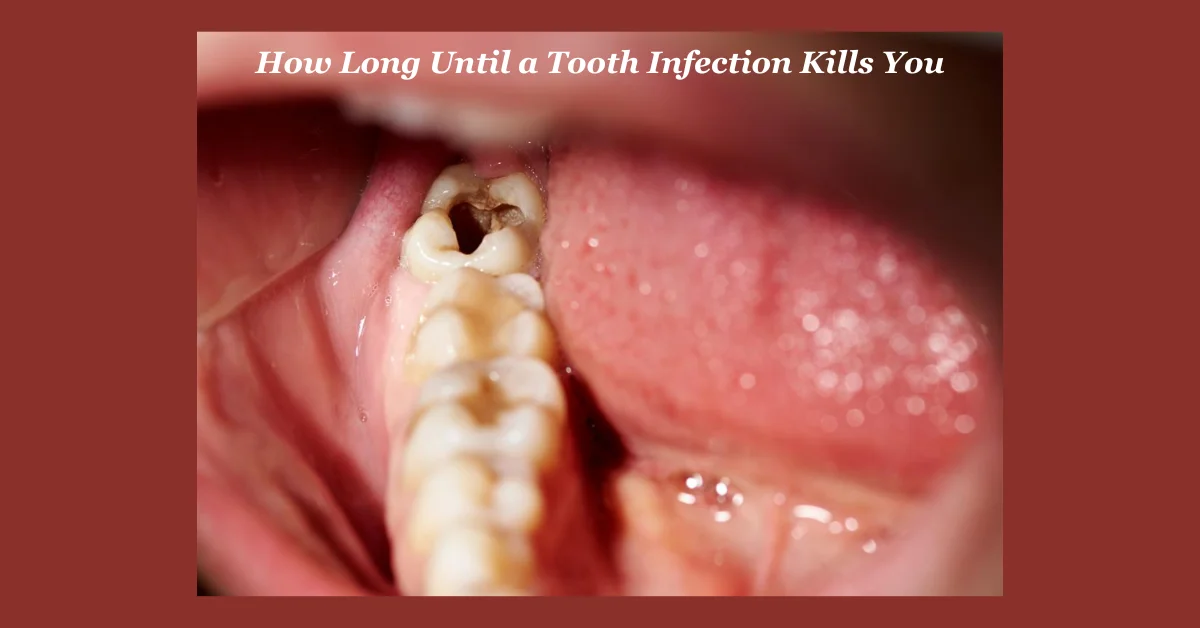How Long Until a Tooth Infection Kills You? Understanding the Risks and Timelines
How long until a tooth infection kills you? It is rare for a tooth infection to kill you, but it is possible if it is untreated for a prolonged period. Why? Because it can spread to other tissues in your body within weeks to months and lead to potentially life-threatening complications and issues. A tooth infection can occur from tooth decay, injury, or previous dental procedures.
Can a Tooth Abscess Kill You?
A tooth infection results when oral bacteria enter the core of soft tissues, known as pus. It is also commonly observed at the time of tooth decay. It’s a medical condition in which a bacteria starts its growth due to chipped or damaged teeth. With enough surface area and favorable factors, bacteria grows and spreads to the nearby teeth, tissues, and roots. If the infected teeth are treated in time, it can lead to healthy teeth and gums, but when they remain untreated, they worsen.
What Makes a Tooth Infection Life-Threatening?
Untreated dental infections can lead to potentially fatal consequences, such as:
- Sepsis: a severe response happens as a result of the infection spreading throughout the body.
- Endocarditis: An inflammation of the heart’s inner lining.
- Necrotizing fasciitis: A dangerous disease that kills soft tissue in the mouth and other parts of the body.
- Blood clots: Blood clots, especially in the sinuses, can occur as a result of infection. These clots might cause serious consequences since they are close to the brain and eyes.
- Brain Abscess: Pus may occur in the brain region as a result of the infection spreading throughout the brain.
Cavity that has reached the Tooth Nerve
Small teeth decay that is left untreated will grow bigger and eventually reach the nerve of the tooth. Once the tooth nerve is infected, you will experience a throbbing tooth pain that comes and goes. That is a pain signal that your body is sending to let you know that something is wrong and you should not leave it untreated. What it looks like is a very big cavity in your tooth. It is basically a big hole and you can usually feel the big hole if you run your tongue over it. The color will appear yellow or brown.
Read More: Wayne Skrawer Age
4 Risk Factors Associated with Tooth Infection
Remember that some patients are more prone to develop these complications than others. Some major risk factors associated with the spread of infections such as:
Older age
Adults of a higher age are at a higher risk of developing tooth infections that lead to severe conditions. It is more common for aged ones to experience severe medical complications than all other age groups.
Immunity
Due to low immunity, immunocompromised patients must fight the infections longer. Their body response to the infections is slow.
Diabetes
Individuals with diabetes are at a higher risk for health complications due to the impaired body’s metabolism and lack of insulin.
Malnourishment
If you are suffering from a chronic disease or had one in the past, there are higher chances that your body is malnourished. In such a case, getting a dental infection makes it harder for the body to fight against it.
How Do You Know If a Tooth Infection Has Spread to Your Blood?
Sepsis is a medical condition where infection spreads to the bloodstream. The risk of sepsis from tooth infection at early stages is relatively low. It is a life-threatening condition where bacteria move to other organs and body systems, resulting in severe complications. Signs and symptoms of your infection are spread to your blood, such as a tooth infection, fa, fever, soreness, and high fever. With such signs, you need medical attention to understand what’s happening with your body and how to overcome it quickly.
How Long Until a Tooth Infection Kills You?
If you are wondering how long before a tooth infection kills you, it’s important to understand the timeline of how the infection develops and spreads. The initial step is the development of a tooth abscess, which begins with tooth decay. As the decay progresses, it can take several months for the abscess to occur. It takes a while for the tooth decay to reach the pulp in the middle of the tooth. But this process can happen more quickly if there is trauma or an injury to the tooth. This weak point in the tooth brings the bacteria into the middle of the tooth faster. So, a serious tooth infection is more common after an injury happens to a tooth.
When the abscess is present, you will likely have a toothache and notice swelling around the affected tooth. This stage of a tooth infection can go on for weeks or even months before a patient seeks emergency dental care. The longer the infection is left untreated, the higher the likelihood of the infection spreading to other parts of the body.
FAQs
Can a tooth infection kill you?
Yes, although it’s rare, an untreated tooth infection can be life-threatening. If the infection spreads beyond the tooth, it can affect other parts of the body, including the bloodstream, leading to severe complications like sepsis, endocarditis, and brain abscesses.
How long does it take for a tooth infection to become dangerous?
It can take weeks or even months for an untreated tooth infection to spread to other parts of the body. However, a dental abscess that forms due to decay or injury should be treated as soon as possible to prevent any risk of it worsening.
What are the warning signs of a spreading tooth infection?
Symptoms of a spreading infection include fever, facial swelling, severe pain, difficulty breathing or swallowing, and signs of sepsis (such as rapid heart rate and high fever). If you experience these, seek immediate medical help.
Who is at higher risk of severe complications from tooth infections?
People at higher risk include older adults, those with diabetes, immunocompromised individuals, and people suffering from malnutrition or chronic diseases. These factors can weaken the immune system, making it harder to fight the infection.
Conclusion
While a tooth infection can become life-threatening if left untreated, this is relatively rare. Timely dental care is essential to prevent complications such as sepsis, endocarditis, and even brain abscesses. Recognizing early symptoms—such as persistent pain, swelling, and fever—can prompt you to seek medical help before the infection spreads. Maintaining good oral hygiene, staying alert to symptoms, and addressing dental issues promptly are key to keeping tooth infections under control and protecting your overall health.
Read Next: Summer Walker BBL





